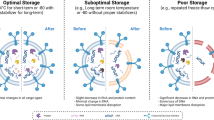Abstract
Extracellular vesicles (EVs) are mediators of intercellular communication by transporting cargo containing proteins, lipids, mRNA, and miRNA. There is increasing evidence that EVs have various roles in regulating migration, invasion, stemness, survival, and immune functions. Previously, we have found that EVs from Kaposi’s sarcoma-associated herpesvirus (KSHV)-infected human endothelial cells have the potential to activate the complement system. Although many studies have shown that the physical properties of EVs can be changed by their storage condition, there have been few studies for the stability of biological activity of EVs in various storage conditions. In this study, we investigated various conditions to identify the best conditions to store EVs with functional stability for 25 d. Furthermore, the correlation between the function and other characteristics of EVs, including the expression of EV markers, size distribution, and particle number, were also analyzed. Our results demonstrated that storage temperature is an important factor to maintain the activity of EVs and would be useful information for basic research and clinical application using EVs.




Similar content being viewed by others
References
Bai L, Shao H, Wang H, Zhang Z, Su C, Dong L, Yu B, Chen X, Li X, Zhang X (2017) Effects of mesenchymal stem cell-derived exosomes on experimental autoimmune uveitis. Sci Rep 7:4323
Bosch S, de Beaurepaire L, Allard M, Mosser M, Heichette C, Chretien D, Jegou D, Bach JM (2016) Trehalose prevents aggregation of exosomes and cryodamage. Sci Rep 6:36162
Burke J, Kolhe R, Hunter M, Isales C, Hamrick M, Fulzele S (2016) Stem cell-derived exosomes: a potential alternative therapeutic agent in Orthopaedics. Stem Cells Int 2016:5802529
Ge Q, Zhou Y, Lu J, Bai Y, Xie X, Lu Z (2014) miRNA in plasma exosome is stable under different storage conditions. Molecules 19:1568–1575
Jeon H, Lee JS, Yoo S, Lee MS (2014) Quantification of complement system activation by measuring C5b-9 cell surface deposition using a cell-ELISA technique. J Immunol Methods 415:57–62
Jeon H, Yoo SM, Choi HS, Mun JY, Kang HG, Lee J, Park J, Gao SJ, Lee MS (2017) Extracellular vesicles from KSHV-infected endothelial cells activate the complement system. Oncotarget 8:99841–99860
Jeyaram A, Jay SM (2017) Preservation and storage stability of extracellular vesicles for therapeutic applications. AAPS J 20:1
Kalra H, Adda CG, Liem M, Ang CS, Mechler A, Simpson RJ, Hulett MD, Mathivanan S (2013) Comparative proteomics evaluation of plasma exosome isolation techniques and assessment of the stability of exosomes in normal human blood plasma. Proteomics 13:3354–3364
Maroto R, Zhao Y, JamaluddinM, Popov VL,Wang H, KalubowilageM, Zhang Y, Luisi J, Sun H, Culbertson CT, Bossmann SH, Motamedi M, Brasier AR (2017) Effects of storage temperature on airway 342 exosome integrity for diagnostic and functional analyses. J 343 Extracell Vesicles 6:1359478
Nolte-‘t Hoen E, Cremer T, Gallo RC, Margolis LB (2016) Extracellular vesicles and viruses: are they close relatives? Proc Natl Acad Sci U S A 113:9155–9161
Osterman CJ, Lynch JC, Leaf P, Gonda A, Ferguson Bennit HR, Griffiths D, Wall NR (2015) Curcumin modulates pancreatic adenocarcinoma cell-derived exosomal function. PLoS One 10:e0132845
Raposo G, Stoorvogel W (2013) Extracellular vesicles: exosomes, microvesicles, and friends. J Cell Biol 200:373–383
Roma-Rodrigues C, Fernandes AR, Baptista PV (2014) Exosome in tumour microenvironment: overview of the crosstalk between normal and cancer cells. Biomed Res Int 2014:179486
Todorova D, Simoncini S, Lacroix R, Sabatier F, Dignat-George F (2017) Extracellular vesicles in angiogenesis. Circ Res 120:1658–1673
Welch JL, Madison MN, Margolick JB, Galvin S, Gupta P, Martinez-Maza O, Dash C, Okeoma CM (2017) Effect of prolonged freezing of semen on exosome recovery and biologic activity. Sci Rep 7:45034
Wendler F, Favicchio R, Simon T, Alifrangis C, Stebbing J, Giamas G (2017) Extracellular vesicles swarm the cancer microenvironment: from tumor-stroma communication to drug intervention. Oncogene 36:877–884
Whiteside TL (2016) Exosomes and tumor-mediated immune suppression. J Clin Invest 126:1216–1223
Yoo SM, Ahn AK, Seo T, Hong HB, Chung MA, Jung SD, Cho H, Lee MS (2008) Centrifugal enhancement of Kaposi’s sarcoma-associated virus infection of human endothelial cells in vitro. J Virol Methods 154:160–166
Zhao H, Yang L, Baddour J, Achreja A, Bernard V, Moss T, Marini JC, Tudawe T, Seviour EG, San Lucas FA, Alvarez H, Gupta S, Maiti SN, Cooper L, Peehl D, Ram PT, Maitra A, Nagrath D (2016) Tumor microenvironment derived exosomes pleiotropically modulate cancer cell metabolism. Elife 5:e10250
Funding
This work was supported by the Basic Science Research Program through the National Research Foundation of Korea (NRF-2017R1A2B4002405). SJP is partially supported by a fellowship from Eulji University Graduate School.
Author information
Authors and Affiliations
Corresponding author
Additional information
Editor: Tetsuji Okamoto
Rights and permissions
About this article
Cite this article
Park, S.J., Jeon, H., Yoo, SM. et al. The effect of storage temperature on the biological activity of extracellular vesicles for the complement system. In Vitro Cell.Dev.Biol.-Animal 54, 423–429 (2018). https://doi.org/10.1007/s11626-018-0261-7
Received:
Accepted:
Published:
Issue Date:
DOI: https://doi.org/10.1007/s11626-018-0261-7




